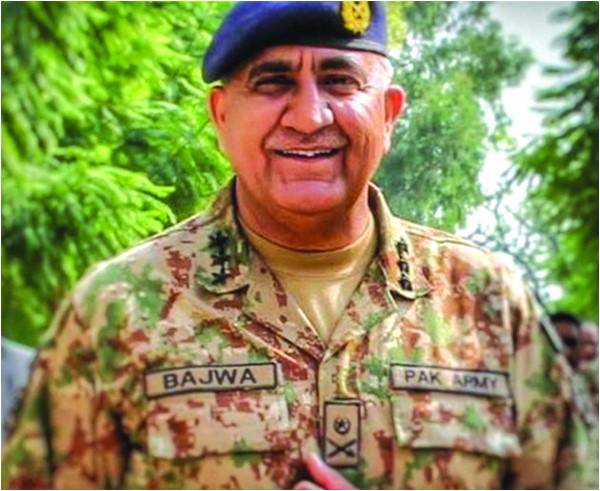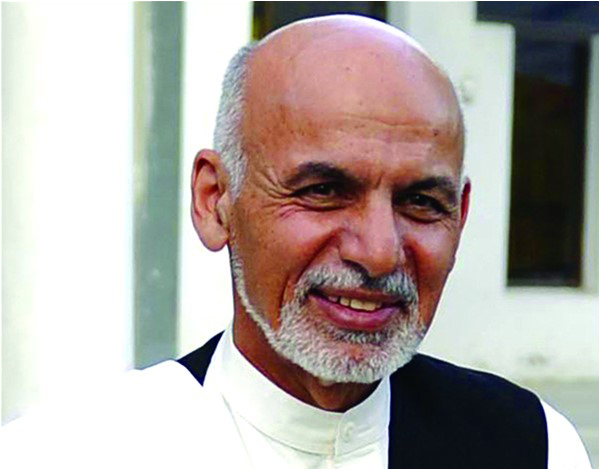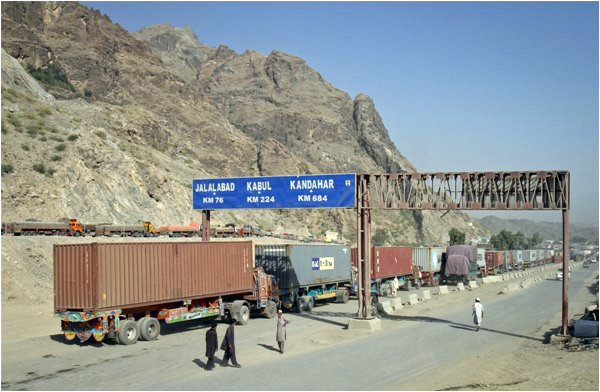
Pakistan’s goodwill gestures to Afghanistan have created a space for improvement of bilateral ties, but a shift towards better relations would require more serious and concrete confidence building measures from both sides.
It was indeed rare for a Pakistani army chief to call Afghan president for offering condolences over deaths caused by terrorist attacks in Kabul, Kandahar, and Helmand, which left dozens including five Emarati diplomats dead. The call was particularly significant because it was made despite continuing allegations from Kabul about existence of terrorist sanctuaries on Pakistani soil from where the attacks in Afghanistan were being facilitated. Later, Adviser on Foreign Affairs Sartaj Aziz’s visited the Afghan embassy in Islamabad for condolences, which in itself was unusual. The message that Mr Aziz carried with him was that terrorism can only be “effectively countered through coordinated efforts carried out in a spirit of mutual trust”.

The fence mending moves by Pakistan, as a matter of fact, were not spurred just by the sympathetic feelings over the death and destruction caused by last week’s terrorist attacks, which in any case have been happening for decade and half now. According the UN figures, 8,397 people were killed in Afghanistan during the first nine months of 2016.
The conciliation moves were instead in the offing due to a realization in Pakistan’s policy circles that acrimonious relations with Afghanistan were neither in its interest nor sustainable. It was in this context that that Army Chief Gen Qamar Bajwa earlier made New Year greetings calls to Afghan leaders.
The Pakistani formula for a rapprochement envisages cooperation on border management and intelligence sharing and an end to blame game. This was suggested by Gen Bajwa in his telephonic conversation with President Ghani and then repeated in meeting with visiting US Centcom Commander Gen Joseph Votel. The civilian side during a meeting between Finance Minister Ishaq Dar and Gen Votel, which was also attended by Defense Minister Khawaja Asif and Director General ISI Lt Gen Naveed Mukhtar, shared the same proposal.
The idea is not exactly new. Afghanistan and Pakistan tried unsuccessfully to forge an intelligence cooperation mechanism in 2014. Last year, Pakistan started implementing its own plan for regulating the cross-border movement under which three gates at the border crossings have been constructed, while another nine are planned. A paramilitary force is also being raised for manning the porous border to prevent unauthorized crossings. Pakistani officials are now pressing Afghanistan to undertake similar measures on its side.

These initiatives are unlikely to succeed unless the core issues straining the ties are not addressed. Afghanistan wants Pakistan to push Taliban to reach a settlement with it and end the insurgency. It would continue blaming Pakistan for the Taliban attacks as long as either Islamabad banishes Taliban and Haqqani leadership or brings them to the table. Islamabad, meanwhile, is concerned about the increased Indian influence in Kabul and would not wholeheartedly contribute until its insecurities vis-à-vis Afghanistan are addressed. Noble intentions aside, forward movement is unlikely as long as the two neighbours do not reach an accommodation on mutual concerns.
Nevertheless, the atmosphere is conducive for making a fresh beginning. Gen Bajwa, at least according to the read-out of the telephonic conversation issued by the Afghan side, assured President Ghani about not repeating the mistakes of the past (whatever that means). Mr Ghani, meanwhile, expressed his willingness to talk to Pakistan if it was serious in discussing the thorny issues. Repetition of 2016, the Afghan president warned, was unacceptable to the people and Government of Afghanistan.
Beyond that the attitude of the two neighbours towards each other would be conditioned to a great extent by policy of the new US administration on Afghanistan. US Secretary of State – designate Rex Tillerson in his opening statement noted that “We must hold our allies accountable to commitments they make. We cannot look the other way at allies who do not meet their obligations; this is an injustice not only to us, but to longstanding friends who honor their promises and bolster our own national security.” Despite the comment being general, it is something for Islamabad to note, notwithstanding President Elect Trump’s ‘fantastic’ comment. The US position is well known that Taliban and Haqqani Network’s senior leadership have sanctuaries in Pakistan and freely act from there.
Centcom Commander Gen Votel, meanwhile, in Islamabad stressed “continued and meaningful engagement between all stakeholders involved in peace and stability for Afghanistan”, besides endorsing what ISPR said “Gen Bajwa’s view on inclusive reconciliation in Afghanistan through an Afghan led and Afghan owned process”. The US general also hinted at “continued military cooperation” with Pakistan. This signal is important from the Afghan perspective.
Afghan leadership can, meanwhile, sell a rapprochement with Pakistan by telling its domestic audience that the assumption of office by the new military and intelligence leadership in Pakistan offers an opportunity to make a fresh start. Gen Bajwa, it should be recalled, has been invited for a visit to Afghanistan.
It should be noted that despite the public rhetoric, both Kabul and Islamabad have been managing their tensions cautiously and have not pushed the bilateral relationship towards a breakup. High-level mechanism for managing border tensions in the aftermath of last year’s Torkham clashes is one such example.
It is imperative that Afghan leadership and Pakistan’s military, which is clearly driving the Afghan policy – as manifested by Gen Bajwa’s outreach to President Ghani and other Afghan leaders – capitalize on the goodwill gestures for re-setting the diplomatic table. In 2017, the two countries should address their mutual concerns and cooperate to end the Afghan conflict.
The writer is a free-lance journalist based in Islamabad
Email: mamoonarubab@gmail.com
Twitter: @bokhari_mr
It was indeed rare for a Pakistani army chief to call Afghan president for offering condolences over deaths caused by terrorist attacks in Kabul, Kandahar, and Helmand, which left dozens including five Emarati diplomats dead. The call was particularly significant because it was made despite continuing allegations from Kabul about existence of terrorist sanctuaries on Pakistani soil from where the attacks in Afghanistan were being facilitated. Later, Adviser on Foreign Affairs Sartaj Aziz’s visited the Afghan embassy in Islamabad for condolences, which in itself was unusual. The message that Mr Aziz carried with him was that terrorism can only be “effectively countered through coordinated efforts carried out in a spirit of mutual trust”.

The Pakistani formula for a rapprochement envisages cooperation on border management, intelligence sharing and an end to the blame game
The fence mending moves by Pakistan, as a matter of fact, were not spurred just by the sympathetic feelings over the death and destruction caused by last week’s terrorist attacks, which in any case have been happening for decade and half now. According the UN figures, 8,397 people were killed in Afghanistan during the first nine months of 2016.
The conciliation moves were instead in the offing due to a realization in Pakistan’s policy circles that acrimonious relations with Afghanistan were neither in its interest nor sustainable. It was in this context that that Army Chief Gen Qamar Bajwa earlier made New Year greetings calls to Afghan leaders.
The Pakistani formula for a rapprochement envisages cooperation on border management and intelligence sharing and an end to blame game. This was suggested by Gen Bajwa in his telephonic conversation with President Ghani and then repeated in meeting with visiting US Centcom Commander Gen Joseph Votel. The civilian side during a meeting between Finance Minister Ishaq Dar and Gen Votel, which was also attended by Defense Minister Khawaja Asif and Director General ISI Lt Gen Naveed Mukhtar, shared the same proposal.
The idea is not exactly new. Afghanistan and Pakistan tried unsuccessfully to forge an intelligence cooperation mechanism in 2014. Last year, Pakistan started implementing its own plan for regulating the cross-border movement under which three gates at the border crossings have been constructed, while another nine are planned. A paramilitary force is also being raised for manning the porous border to prevent unauthorized crossings. Pakistani officials are now pressing Afghanistan to undertake similar measures on its side.

These initiatives are unlikely to succeed unless the core issues straining the ties are not addressed. Afghanistan wants Pakistan to push Taliban to reach a settlement with it and end the insurgency. It would continue blaming Pakistan for the Taliban attacks as long as either Islamabad banishes Taliban and Haqqani leadership or brings them to the table. Islamabad, meanwhile, is concerned about the increased Indian influence in Kabul and would not wholeheartedly contribute until its insecurities vis-à-vis Afghanistan are addressed. Noble intentions aside, forward movement is unlikely as long as the two neighbours do not reach an accommodation on mutual concerns.
Nevertheless, the atmosphere is conducive for making a fresh beginning. Gen Bajwa, at least according to the read-out of the telephonic conversation issued by the Afghan side, assured President Ghani about not repeating the mistakes of the past (whatever that means). Mr Ghani, meanwhile, expressed his willingness to talk to Pakistan if it was serious in discussing the thorny issues. Repetition of 2016, the Afghan president warned, was unacceptable to the people and Government of Afghanistan.
Beyond that the attitude of the two neighbours towards each other would be conditioned to a great extent by policy of the new US administration on Afghanistan. US Secretary of State – designate Rex Tillerson in his opening statement noted that “We must hold our allies accountable to commitments they make. We cannot look the other way at allies who do not meet their obligations; this is an injustice not only to us, but to longstanding friends who honor their promises and bolster our own national security.” Despite the comment being general, it is something for Islamabad to note, notwithstanding President Elect Trump’s ‘fantastic’ comment. The US position is well known that Taliban and Haqqani Network’s senior leadership have sanctuaries in Pakistan and freely act from there.
Centcom Commander Gen Votel, meanwhile, in Islamabad stressed “continued and meaningful engagement between all stakeholders involved in peace and stability for Afghanistan”, besides endorsing what ISPR said “Gen Bajwa’s view on inclusive reconciliation in Afghanistan through an Afghan led and Afghan owned process”. The US general also hinted at “continued military cooperation” with Pakistan. This signal is important from the Afghan perspective.
Afghan leadership can, meanwhile, sell a rapprochement with Pakistan by telling its domestic audience that the assumption of office by the new military and intelligence leadership in Pakistan offers an opportunity to make a fresh start. Gen Bajwa, it should be recalled, has been invited for a visit to Afghanistan.
It should be noted that despite the public rhetoric, both Kabul and Islamabad have been managing their tensions cautiously and have not pushed the bilateral relationship towards a breakup. High-level mechanism for managing border tensions in the aftermath of last year’s Torkham clashes is one such example.
It is imperative that Afghan leadership and Pakistan’s military, which is clearly driving the Afghan policy – as manifested by Gen Bajwa’s outreach to President Ghani and other Afghan leaders – capitalize on the goodwill gestures for re-setting the diplomatic table. In 2017, the two countries should address their mutual concerns and cooperate to end the Afghan conflict.
The writer is a free-lance journalist based in Islamabad
Email: mamoonarubab@gmail.com
Twitter: @bokhari_mr

